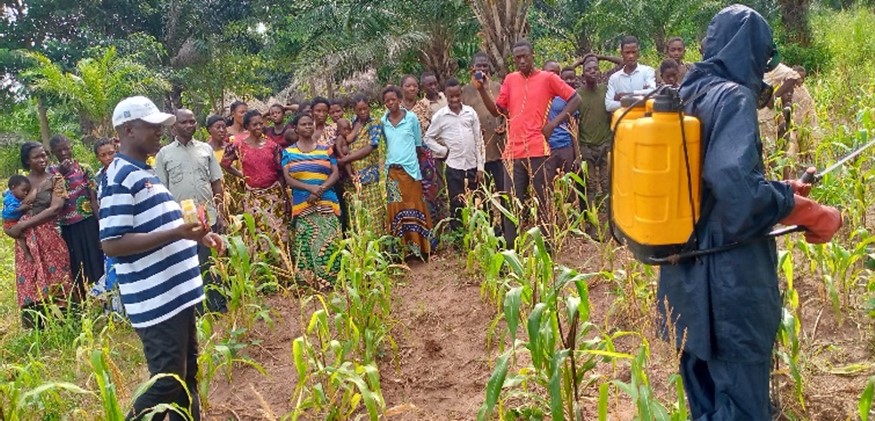The fall armyworm is one of the world's most devastating crop pests. Ruphin Mutebua, a spokesperson for crop protection, shares how he's combatting fall armyworm with the support of a Feed the Future program in the DRC.
Banner image: Awareness sensitization session to local leaders and other maize producers Ngandajika Territory, DRC
The fall armyworm is one of the world's most fearsome crop pests. With its ability to feed on over 80 different crop species, including staple foods such as maize, sorghum, rice, and wheat, the pest is a major threat to smallholder farmers and to food security. In the Democratic Republic of the Congo (DRC), more than a million hectares of maize fields have been devastated throughout the country by this pest since it began in 2016.
Since October 2019, a Feed the Future program has been supporting maize smallholder farmers in managing this devastating pest. In its intervention area of eight of the DRC's provinces, this project provides technical support to over 30,000 smallholders maize producers, giving them equal access to information, skills and inputs needed to safely and efficiently manage the fall armyworm and increase maize yields through Good Agricultural Practices (GAP) and Integrated Pest Management (IPM) techniques.
The Ruphin Mutebua Input Supply Shop is one of the businesses that benefited from the activity’s support in the territory of Ngandajika, province of Lomami. TIts owner, Ruphin Mutebua, explained that he previously only had one small selling point in the market of Ngandajika. After receiving a grant from the activity in October 2022, Ruphin worked extraordinarily hard to reach out and support Lomami's remote agricultural producers’ community. Between January and March 2023, Ruphin’s business hosted 38 awareness-raising events on fall armyworm management based on GAP and IPM techniques. These events reached more than 1,151 maize producers. He also increased the number of his resellers by 93 percent and opened two additional selling points in Lomami province (Kabinda and Bakua Mulumba) and another in Bakua Dianga main market in Mbuji Mayi town (Kasai Oriental).
Ruphin Mutebua has since become a model of success in supporting producers with crop protection products and extension services. He raised awareness among maize producers through radio broadcasting programs, promoting his agricultural products and services, while educating farmers from rural communities about the safer use of pesticides in the management of fall armyworm. Farmers in the neighboring Haut Lomami province traveled more than 300 kilometers to visit Ruphin’s enterprise to learn about pesticides that could help them combat the fall armyworm. With Ruphin’s help, they were trained and collected outreach materials. Some of them have expressed interest in becoming resellers of Ruphin’s input supplies in their neighborhoods.
With his passion for crop protection, Ruphin Mutebua explained his vision: ‘’Apart from conducting our agricultural input marketing business, we are passionate about accompanying farmers helping them with good understanding and management of fall armyworm." However, he also explained that he needed to go beyond traditional means of training to accomplish these goals, "Ideally, we would like to support maize farmers through training visits, but given the logistical constraints and the current state of access roads, we [needed to raise] awareness through interactive radio broadcasts programs. We had signed a collaboration protocol with the Ditunga community radio station in Ngandajika, Lomami province ... [This] helped us organize interactive radio programs and listening clubs where model producers were invited to share their experiences in FAW recognition and management."
Many maize producers expressed their satisfaction with Ruphin Mutebua’s efforts to make agricultural inputs affordable and accessible to them. For example, Madame Anny LUADI from Kanyenga village, close to Ngandajika, explained: "Before Ruphin started his activities in our village, a farmer who wanted to buy a 100-milliliter bottle of pesticide had to spend 85,500 FC (USD $31) of transport fees from Kanyenga to Mbuji Mayi, a distance of more than 120 kilometers. Now that Etablissement Ruphin has identified a reseller in our village, we can afford it directly, and the cost of a 100-milliliter bottle has decreased to 10,500 FC (USD $4)".
Through Ruphin's efforts and the support of the Feed the Future DRC Fall Armyworm project, farmers in the area are gaining better access to pesticide selling points and have a stronger understanding of how to tackle the pest.

Ruphin Mutebua facilitating a demonstration session with farmers on safer use of pesticide and critical threshold evaluation for pesticide application in Mpata village, Ngandajika territory.